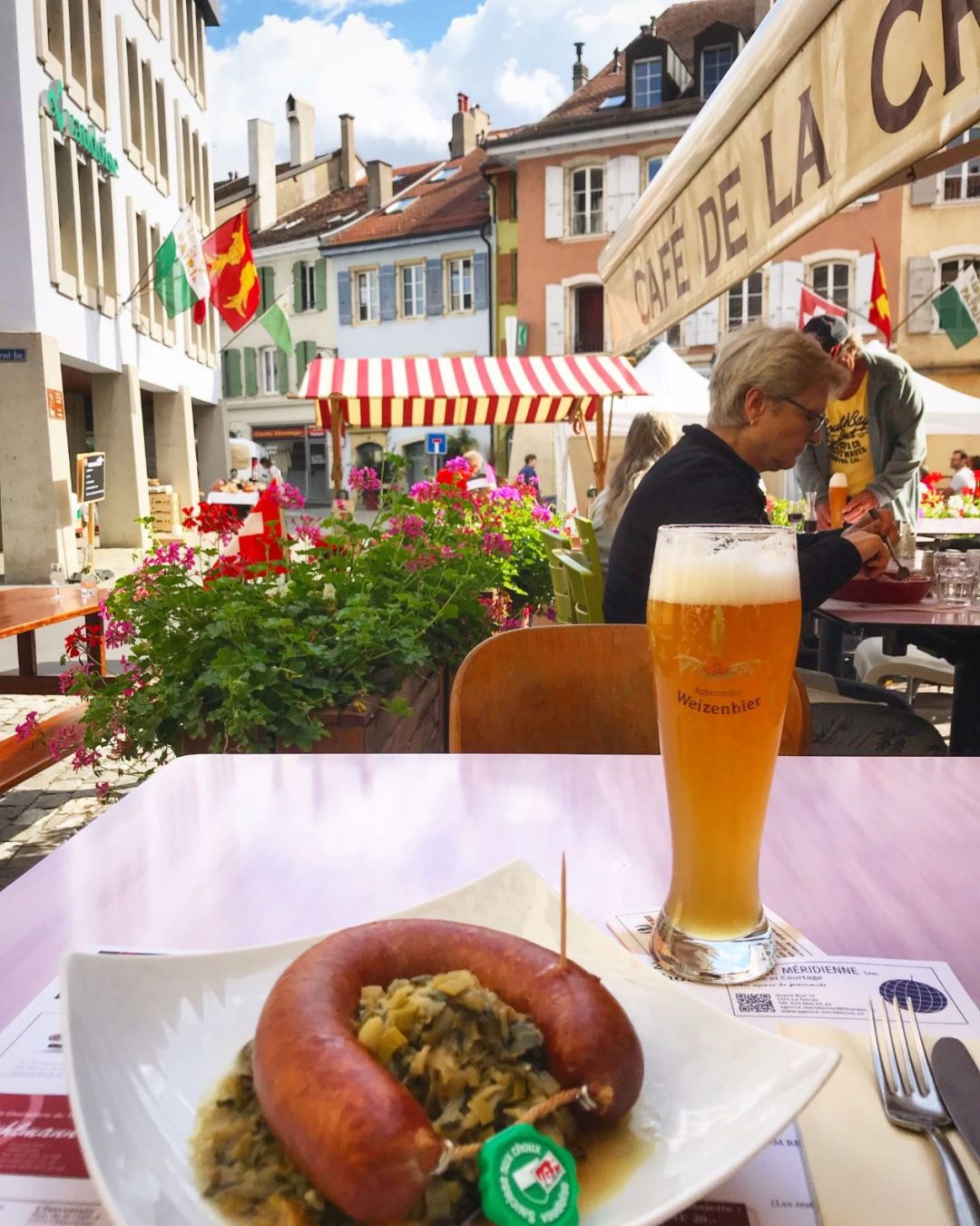By Anna O. Giarratana, Fulbright U.S. Student to Switzerland
“Food is a universally vital part of our lives, representing history, traditions, and culture. Each of us relies on food not only to survive, but to comfort ourselves, communicate with others, and connect us to our forebears.”
—Sam Chapple-Sokol
When I started my Fulbright at the Zurich Center for Neuroeconomics in Switzerland, I was largely excited about the professional opportunity before me; I had just finished the PhD portion of my joint MD-PhD program, and I was joining a research lab on the forefront of conducting experiments in the nascent field of neuroeconomics. The field, studying how people make decisions, brings neuroscientists like me together with economists, computer scientists, and psychiatrists. In addition to my research, I was also eager to spend my weekends exploring my hobby interest, traditional food—in particular, traditional cured meat products. What I didn’t anticipate when I started my Fulbright was how important those culinary trips would be in giving me a sense of community within the country.
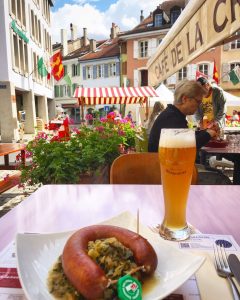
Caption: Enjoying saucisse aux choux in Orbe.
In my first few weeks, I researched online to identify fall festivals highlighting traditional Swiss cured meats. The last weekend in September, armed with Swiss Federal Railways (SBB) Transit and Google Maps, I set off to find the Fête de la Saucisse aux Choux à Orbe. After two hours of rail travel and walking, I found myself in the small hilltop town of Orbe, transported back centuries as I watched local artisans make the famous saucisse aux choux, a local sausage made with cabbage. My efforts to engage the local artisans in discussion about their process suffered an initial set-back when I tried speaking German, which I had studied in preparation for my move to Zurich. I was now in French Switzerland. Uh oh.
What are the French words for “What is this?” again? Luckily, in response to my blank stare, the artisans switched to German and then to Italian, and I was able to muddle through the exchange. I learned that day that the Swiss tend to be fluent in at least two of the national languages, in addition to English, inspiring me to dedicate myself more diligently to my language studies.
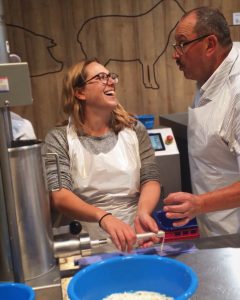
Caption: Learning to make kalbsbratwurst at Olma Messen.
In the following months, I explored Switzerland, a small country but one brimming with unique culinary traditions. I joined a wild food foraging group in Zurich, traveled to St. Gallen for the Olma Messen agricultural trade show; to Porrentruy for the “Feast and Market,” Fête et Marché de la St-Martin; to Chur for the fall exhibit, Guarda Herbstmesse;, to Bonvillars for the Marché aux Truffes; to Gruyères to the La Maison du Gruyère; to Lucerne for Käsefest; and to Ticino for its Stranociada carnival. And, along the way, I gained a greater understanding—through food—of Swiss history. I learned about the different cantons (member states) that make up Switzerland, the languages they speak, the traditions they practice, the products they create, and the values they hold.
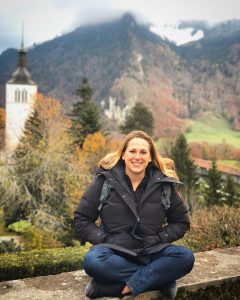
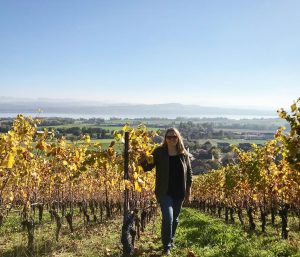
Caption: View of Gruyères; Vineyards at the Truffle Market in Bonvillars.
Most importantly, it was through these travels and my bumbling German/French/Italian questions that I made my best friends, both Swiss locals and other internationals like myself, over our shared love for food. We sustained these cross-cultural friendships by creating a rotating dinner group, where we took turns hosting and making our native food or traditional Swiss foods. I learned to make capuns and härdöpfel pizokel from the Graubünden region of Switzerland, enjoyed moqueca from Brazil, and taught others how to make my favorite Italian-American family recipe, potato gnocchi. We shared food, wine, and anecdotes from our time and travels, domestically and internationally. I heard firsthand about the importance of the direct democracy system in Switzerland, which results in voting on quarterly referendums. I learned more about life in India—its different regions, the way the university system works, and how highly valued a government job is. In China, the bestselling books placed in the entry display of bookstores are not works of fiction, but nonfiction books highlighting the value of self-improvement. I shared my experiences with healthcare in the United States: as a medical student, I have a vested interest in improving the U.S. healthcare system. I solicited opinions on what works and what doesn’t work, internationally. Beyond interacting with my local community, I have connected to a global audience by describing my Swiss food explorations on my personal blog and Instagram account “The Gastrochemist.” I have heard from homesick Swiss expats, as well as interested people around the world.
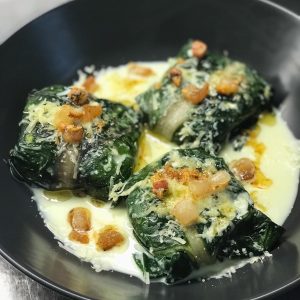
Caption: Homemade Swiss Capuns
In light of the COVID-19 pandemic, this idea of a global community created and sustained through food has become even more vital. Serious conversations with my roommates about past crises they have lived through occurred over shared homemade wiener schnitzel. While I have been practicing social distancing, the internet has allowed me to learn about the comfort foods others are making in countries such as Italy, Singapore, and Australia. Meanwhile, I’m sharing some of my comfort food projects, most recently making homemade pasta with a rabbit sauce called tajarin al ragù di coniglio.
I never could have predicted where I would be six months into my Fulbright: alone in a room with the internet, cooking just for myself, but sharing with the world. If this year has taught me anything, it’s that we’ll get through this together, with a little food and a lot of human spirit.
Anna O. Giarratana is an MD-PhD student at Rutgers University – Robert Wood Johnson Medical School. Originally from Franklin Lakes, NJ, she attended Bryn Mawr College where she majored in Chemistry and cultivated her love for global learning. She is passionate about interdisciplinary, multinational work – believing it to be the best way to tackle difficult problems. As a neuroscientist, she has contributed to the field with multiple publications in peer-reviewed journals and presentations at international conferences. For her Fulbright, she worked at the Zurich Center for Neuroeconomics, an innovative interdisciplinary center dedicated to understanding the cognitive process of decision-making.
The Art of Swiss Compromise: Reflections on a Fulbright Study/Research Grant
November 27, 2014‘No ideas but in things’
– William Carlos Williams, American poet
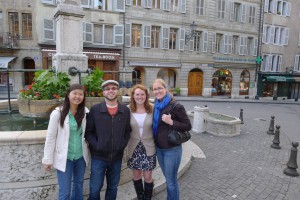
Caroline Kirby, 2012-2013, Switzerland (far right), with fellow Fulbright U.S. Students (left to right) Kun-Wei, Tevor, and Caitlin in Geneva’s Old Town. (Photo credit: Adam Duker)
I took a metaphorical page from William Carlos Williams’ book when I started my life in Geneva, Switzerland. Instead of reading about the region’s culture, while a full-time student at Université de Genève, I experienced it in the banal and quotidian. And as a result, I learned to consider the needs and preferences of others before my own.
I discovered that certain concepts like punctuality and work-life balance are expressed much more elegantly on paper than they are experienced in daily life. The locked doors of lecture halls and offices, for example, shamed my American tendency to arrive ‘fashionably late’ for events and appointments. And the sanctity of Sunday, when most shops and libraries remain closed, disrupted my typical seven-day-week rhythm of productivity.
I also saw the lofty notion of compromise embodied in everyday local practices. Trams, cars and bicycles respect reserved lanes and stop lights. Official documents contain at least three languages (German, French, and Italian) to accommodate the language preferences of Swiss citizens. And French and German language television networks temporarily exchange newscasters to express appreciation for the language of others.
Bringing Darkness to Light on Fulbright, By Samantha Lakin, 2011-2012, Switzerland
December 27, 2011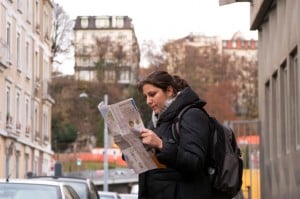 My global perspective has truly evolved during my Fulbright grant in Lausanne, Switzerland. The essence of my Fulbright research has been to record and analyze oral histories of child Holocaust survivors who were rescued as refugees and brought into Switzerland during World War II. My project has become much more than a series of interviews with some of the world’s most unique individuals. By meeting people who experienced one of history’s darkest periods of persecution and fanaticism, I have learned perhaps one of the most important lessons influencing my perspective: meaningful work and life in a multicultural environment require truly accepting others and extending oneself to build trust. Many of the Holocaust survivors I’ve interviewed were rescued by non-Jewish citizens of different nationalities who risked their lives to combat the hatred the Nazi regime embodied. Through their experiences with genocidal madness, these survivors have solidified my global perspective and helped me to believe in the strength of the individual.
My global perspective has truly evolved during my Fulbright grant in Lausanne, Switzerland. The essence of my Fulbright research has been to record and analyze oral histories of child Holocaust survivors who were rescued as refugees and brought into Switzerland during World War II. My project has become much more than a series of interviews with some of the world’s most unique individuals. By meeting people who experienced one of history’s darkest periods of persecution and fanaticism, I have learned perhaps one of the most important lessons influencing my perspective: meaningful work and life in a multicultural environment require truly accepting others and extending oneself to build trust. Many of the Holocaust survivors I’ve interviewed were rescued by non-Jewish citizens of different nationalities who risked their lives to combat the hatred the Nazi regime embodied. Through their experiences with genocidal madness, these survivors have solidified my global perspective and helped me to believe in the strength of the individual.
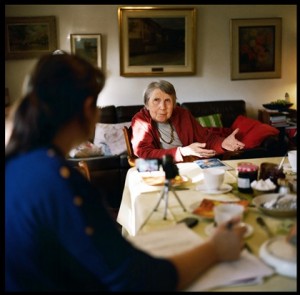 Living and working in Switzerland as a Fulbright U.S. Student is exciting and challenging. I have received an incredible response from the international and Swiss academic community, meeting with top World War II history scholars and gaining advice from some key players in the field. I also had the unique opportunity to meet Mr. Serge Klarsfeld, the most famous modern lawyer known for trying Nazi criminals for crimes against humanity, and to speak with him about my Fulbright experience. The respect I’ve gained as an up-and-coming scholar in Switzerland is rare. The support from communities in Lausanne, Zurich, Basel, Geneva, and other local Swiss governments has been overwhelming. I even had a chance to accompany a Swiss historian on a day-long trip across the French-Swiss border to learn about the history of border crossings during World War II and to gain a visual for my documented stories. Additionally, videotaping interviews with the last generation of Holocaust survivor children (specifically, adolescents who were rescued and taken to Switzerland to escape Nazi persecution) has been an eye-opening experience. Some survivors escaped through legal routes like the KinderTransport that left Germany for Switzerland right before the war, and others escaped clandestinely with organizations and “passeurs,” or smugglers, risking their lives to cross French and German borders into Switzerland.
Living and working in Switzerland as a Fulbright U.S. Student is exciting and challenging. I have received an incredible response from the international and Swiss academic community, meeting with top World War II history scholars and gaining advice from some key players in the field. I also had the unique opportunity to meet Mr. Serge Klarsfeld, the most famous modern lawyer known for trying Nazi criminals for crimes against humanity, and to speak with him about my Fulbright experience. The respect I’ve gained as an up-and-coming scholar in Switzerland is rare. The support from communities in Lausanne, Zurich, Basel, Geneva, and other local Swiss governments has been overwhelming. I even had a chance to accompany a Swiss historian on a day-long trip across the French-Swiss border to learn about the history of border crossings during World War II and to gain a visual for my documented stories. Additionally, videotaping interviews with the last generation of Holocaust survivor children (specifically, adolescents who were rescued and taken to Switzerland to escape Nazi persecution) has been an eye-opening experience. Some survivors escaped through legal routes like the KinderTransport that left Germany for Switzerland right before the war, and others escaped clandestinely with organizations and “passeurs,” or smugglers, risking their lives to cross French and German borders into Switzerland.
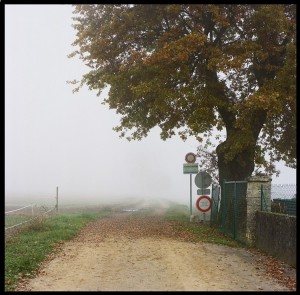 As a Fulbright cultural ambassador to Switzerland from the United States, I have been able to make many connections that have enhanced my research. At the United States Ambassador’s reception for Fulbrighters and alumni in Bern, I was able to meet Laura Bernier, a professional photographer and former Fulbrighter to Switzerland. Since this meeting, Laura and I have been working together on a photographic representation of my research. We’ve taken photos of the places in Switzerland where refugee children crossed borders and subsequently lived and worked, as well as portraits of the Holocaust survivors I’ve interviewed. Ultimately, I cannot wait to finish my research, which will culminate in the publication of an article in an academic journal and also in a presentation at the United States Embassy in Switzerland in May 2012. The Fulbright Program has allowed me to shed light on a multifaceted aspect of World War II and to showcase one of its little known histories.
As a Fulbright cultural ambassador to Switzerland from the United States, I have been able to make many connections that have enhanced my research. At the United States Ambassador’s reception for Fulbrighters and alumni in Bern, I was able to meet Laura Bernier, a professional photographer and former Fulbrighter to Switzerland. Since this meeting, Laura and I have been working together on a photographic representation of my research. We’ve taken photos of the places in Switzerland where refugee children crossed borders and subsequently lived and worked, as well as portraits of the Holocaust survivors I’ve interviewed. Ultimately, I cannot wait to finish my research, which will culminate in the publication of an article in an academic journal and also in a presentation at the United States Embassy in Switzerland in May 2012. The Fulbright Program has allowed me to shed light on a multifaceted aspect of World War II and to showcase one of its little known histories.
For those recent graduates applying to the Fulbright Program to pursue a study or research grant, my advice is simple:
- Find a project about which you are truly passionate and let your love for the subject shine through in your application.
- Once you’ve found a great idea, focus and ground yourself in realistic expectations.
- Make sure your essays reveal your personality, but are also focused on what you can reasonably accomplish in a short year, why your research must be funded and why you are the right person for your project.
- Rally support from professors, scholars in the field and others. Don’t be shy in asking for advice from your Fulbright Program Adviser or former Fulbrighters.
The Fulbright experience — the unique opportunity to follow a passion for one year — is worth any challenge you may encounter beforehand. I wish the best of luck to all of the 2012-2013 applicants!
Top photo: Samantha Lakin, 2011-2012, Switzerland, navigating the streets of Lausanne
Middle photo: Samantha Lakin, 2011-2012, Switzerland, interviewing a Holocaust survivor
Bottom photo: The French-Swiss Border, Crossing Point 50
All photos taken by Fulbright alumna Laura Bernier, 2008-2009, Switzerland

